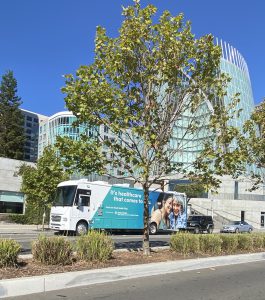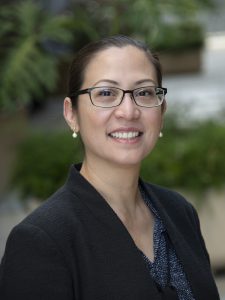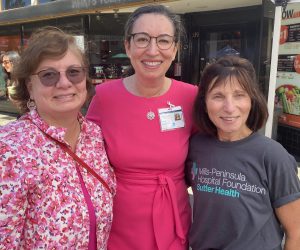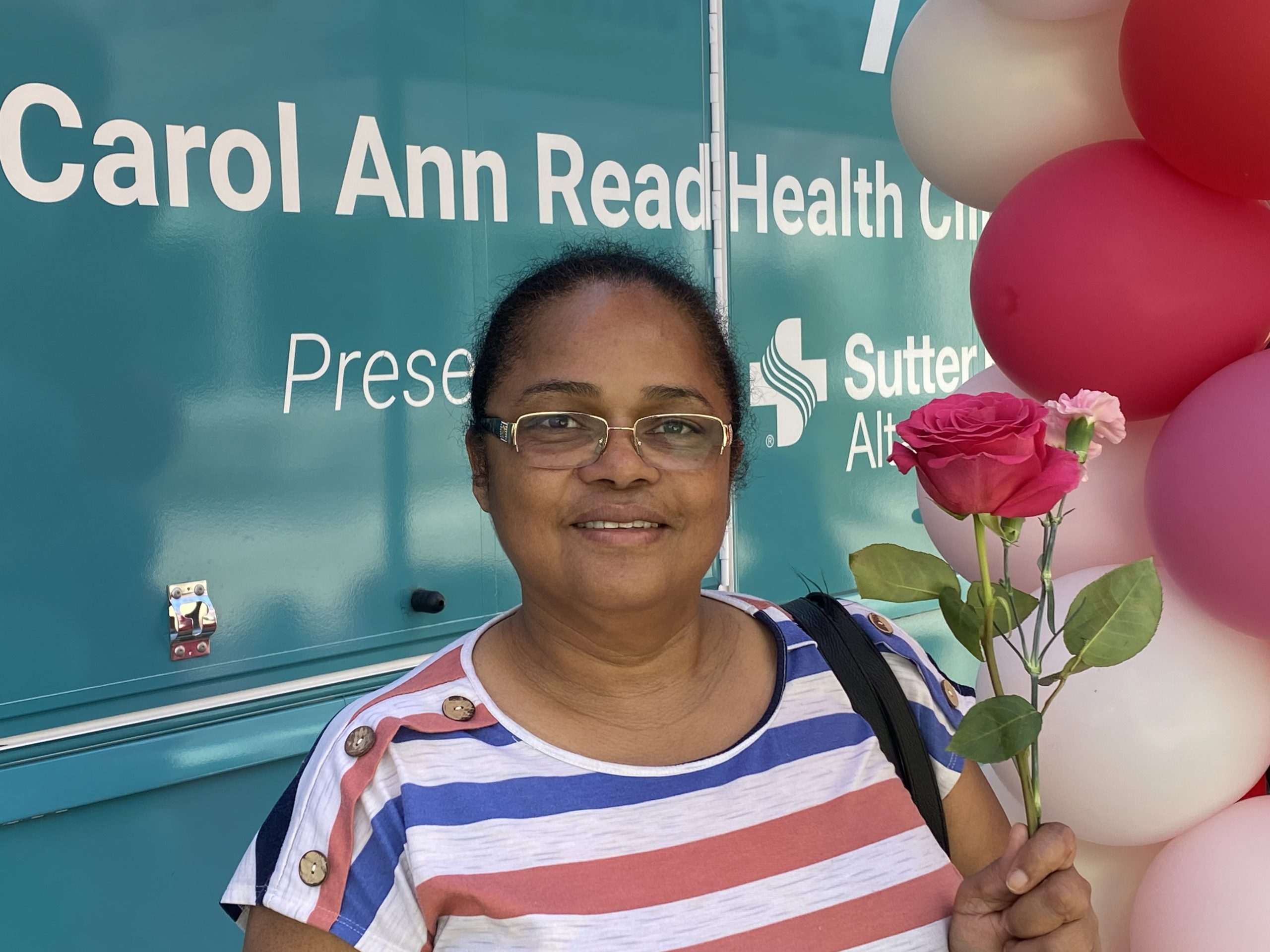(Above) Esther Figueroa attended a screening mammography event put on by Sutter Alta Bates Summit Medical Center’s Carol Ann Read Breast Health Center and the Order of Malta Clinic of Northern California.
By Monique Binkley Smith and Emma Dugas, Vitals contributors
Mobile Mammography Vehicle Goes the Extra Mile to Screen Underserved Women
Breast cancer affects people across all ages, ethnicities and incomes. However, while all women have some risk of breast cancer, a National Institute of Health analysis confirms low income women and Black or Latina women are more vulnerable to poor outcomes because, due to a lack of regular screenings among other barriers, their breast cancer is often diagnosed at a more advanced stage.
To help identify and treat breast cancer earlier in these women, mobile mammography vehicles like the one operated by Sutter’s Alta Bates Summit Medical Center, are taking screening services into communities to increase access to mammograms to low-income women where they live and work.

Sutter Alta Bates Summit Medical Center’s Carol Ann Read Breast Health Center mobile mammography vehicle offers access to 3-D screening mammograms out in the community.
Recently, Alta Bates Summit’s Carol Ann Read Breast Health Center mobile mammography vehicle kicked off Breast Cancer Awareness month with screening events with the Order of Malta Clinic of Northern California and a “Pink Patch Party” with the San Mateo Police Officers Association.
At the October 4 screening event in Oakland, Order of Malta Clinic patient Esther Figueroa expressed her gratitude for the breast cancer screening and said she knows women in her community who avoid mammograms because they are concerned about what a scan might reveal. Figueroa says she encourages these reluctant women to get their mammograms, “I know some women who are scared that something is there in their breast, but they say they don’t want to know. I tell them, ‘Go get checked and if it’s there, they will get you treatment and help you!’”
Dr. Rita Kwan-Feinberg, a surgeon with Sutter East Bay Medical Foundation and co-director of the Carol Ann Read Breast Health Center, agrees with Figueroa’s advice to her reluctant friends.
Dr. Kwan-Feinberg says, “Our mobile mammography vehicle helps us reach women in our community who might not otherwise have access to screening mammography. Connecting with these women is critical because early detection is the best defense. In fact, the overwhelming majority of women who are diagnosed with breast cancer have no family history of it and in the early stages of breast cancer, most women have no symptoms. When we find breast cancer at an early stage, it’s beneficial to our patients because that’s when we have the most treatment options –and early treatment leads to better long-term survival rates.”

Dr. Rita Kwan-Feinberg, Sutter East Bay Medical Foundation
Order of Malta Clinic nurse practitioner Mary Rudolph was grateful for the screening event and says no-cost screening events are vitally important to her patients because most of them are underinsured or uninsured, “These patients can’t get services because they can’t afford it –it’s a matter of putting food on the table or paying for health insurance. So, they carry this burden of the fear of the unknown, of what’s going on with their health.”
Increasing early detection and improving long-term survival rates are the reason the staff and Sutter-affiliated physicians of the Carol Ann Read Breast Health Center are dedicated to expanding access to screening mammograms in the community. Since launching in late 2020, nearly 900 screening mammograms have been performed aboard the Carol Ann Read Breast Health Center’s mobile mammography vehicle and the numbers are increasing as the pandemic wanes and more screenings per event are able to be scheduled.
Learn more about screening mammography, guidelines and breast cancer symptoms here.
“I’m proud as a physician and as a mom and daughter to be part of the Carol Ann Read Breast Health Center providing mammography to women in the community. We have many women out there who are moms, sisters and daughters who are busy with life. To be able to bring screening mammography for early detection to them makes a world of difference not only for the women but for their families,” says Dr. Kwan-Feinberg.
Families were a central theme at a different screening event, held in downtown San Mateo on October 7. With music, food, pumpkins to paint, a bounce house and other games and prizes the event encouraged the whole family – and the entire community – to come out and show women that they don’t face the possibility of breast cancer alone.
“I want people to feel supported, to know that resources and help are available, and that if cancer does come into your life, we will rally around you,” said unlikely breast cancer crusader and San Mateo Police Officer Julio Jolivette.
Officer Jolivette was transformed into tireless advocate for breast cancer awareness after helping his mom, Jeanette Ramirez, battle and beat the disease. Taking a cue from the community service and outreach activities of his Police Officers Association, Jolivette asked his department to be a convener, to help residents address the most common cancer diagnosis among women, head-on.
Jolivette’s goal was realized when he worked with Sutter to bring the Carol Ann Read Breast Health Center mobile mammography vehicle to the no-cost screening event which doubled as a “street party.”

Left to Right: Dolores Perez, breast care coordinator at Samaritan House clinics, Dr. Dorra Sellami, medical director of breast imaging at Sutter Health Mills-Peninsula Medical Center, and Laurie Benson, Mills-Peninsula Hospital Foundation.
Dr. Dorra Sellami, medical director breast imaging at Sutter Health Mills-Peninsula Medical Center, was also in attendance and spoke about the importance of early detection.
“Early detection not only saves lives, but it results in less aggressive treatment, less invasive surgery, less radiation, less chemotherapy,” said Dr. Sellami. Beyond the one-day event Sutter Mills-Peninsula offers no-cost screening mammograms to underinsured women year-round, thanks to the generosity of local donors.
In addition to promoting awareness, presenting education and providing mammograms, the “Pink Patch Party” showed the public that a robust safety-net exists in San Mateo County to ensure that no woman falls through the cracks, regardless of her insurance coverage or residency status. To that point, representatives from Samaritan House clinics and San Mateo Medical Center (the local county public hospital) shared how they work with Sutter’s Mills-Peninsula Medical Center to collaboratively care for women who receive a positive diagnosis, throughout the continuum of care.
About the Mobile Mammography Vehicle
The Carol Ann Read Breast Health Center mobile mammography vehicle is made possible by a generous grant from Peter Read, co-founder of Grocery Outlet, in honor of his wife Carol Ann Read who passed away from breast cancer, a Sutter match grant, as well as donations from community members. Read’s vision for the mobile mammography vehicle is to bring breast cancer screening services to underserved people in the community who have more barriers to accessing these services.






